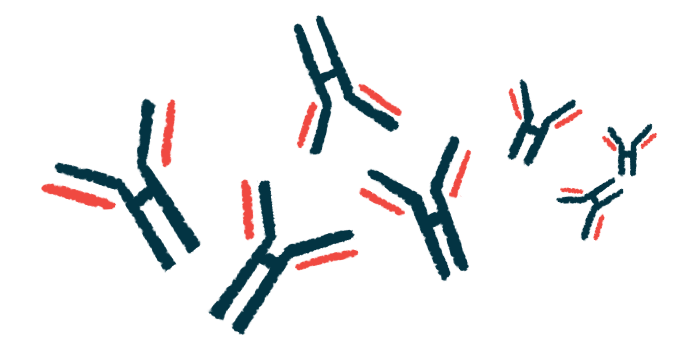ACTRIMS 2023: Uplizna doesn’t increase risk of COVID-19 infection
Analyses of Phase 2/3 N-MOmentum trial examined multiple effects on NMOSD patients
Written by |

Uplizna (inebilizumab) does not increase the risk of COVID-19 infection or reduce the levels of antibodies produced from prior childhood vaccines among people with neuromyelitis optica spectrum disorder (NMOSD).
That’s according to two posterior analyses of data from the Phase 2/3 N-MOmentum clinical trial (NCT02200770) after the study was completed.
These findings were presented in two posters at the Americas Committee for Treatment and Research in Multiple Sclerosis (ACTRIMS) Forum 2023, held Feb. 23–25 in San Diego and virtually.
“Through ongoing studies and clinical use, we are learning that Uplizna’s impact on NMOSD activity is very focused and may not interfere with certain other immune responses,” Bruce Cree, MD, PhD, a professor of clinical neurology at the University of San Francisco Weill Institute for Neurosciences and one of the poster presenters, said in a press release from Horizon Therapeutics, Uplizna’s developer.
Uplizna is an approved into-the-vein therapy for adults with NMOSD who are positive for antibodies against aquaporin-4 — the most common target of disease-causing antibodies. It works to deplete antibody-producing B-cells that are thought to contribute to the abnormal immune attacks that drive NMOSD.
However, because B-cells also are important for producing antibodies the body needs for healthy immune responses, B-cell depleting therapies like Uplizna could render vaccines less effective and lower the body’s ability to fight off infections.
Data from the Horizon-sponsored N-MOmentum trial, which enrolled 230 NMOSD patients (93% positive for anti-AQP4 antibodies), supported Uplizna’s regulatory approvals.
Participants were assigned randomly to receive either Uplizna or a placebo for six months, followed by an open-label extension (OLE) phase in which all participants received an Uplizna injection once every six months.
Data from N-MOmentum showed that the treatment led to an almost complete B-cell depletion within about a month, which was sustained over at least four years in the OLE.
In the poster “Clinical Outcomes of COVID-19 Infection Among Patients with NMOSD Receiving Inebilizumab Treatment in the N-Momentum Trial and Safety Database in the United States,” Cree and colleagues explored whether this B-cell depletion was associated with an altered susceptibility and clinical response to COVID-19 infection.
Among the 182 patients who received Uplizna from March to November 2020 — the part of the N-MOmentum OLE that overlapped with the COVID-19 pandemic — two developed COVID-19.
An additional 15 cases spontaneously reported by healthcare providers to a safety database after Uplizna’s U.S. approval, with a cut-off of July 31, 2022, also were included in the analysis.
Infected patients had a median age of 57 years and at least 15 were women. (Sex was not disclosed in the other two cases.) Most of the reported cases occurred in the U.S. and patients had been using Uplizna for a median of 207.5 days, or a little more than six months, before infection.
Overall, 10 cases were considered to be serious, and the vaccination status of these patients wasn’t known.
Two people died: one in the N-MOmentum study prior to COVID-19 vaccine availability, and one in the safety database, with possible partial vaccination. Both had possible COVID-19-related pneumonia and other complications.
‘Quite good’ news
The remaining patients with a known outcome “seem to have recovered well,” Cree told Neuromyelitis News during the poster presentation. “For patients and caregivers, overall the news here [are] actually quite good.”

Bruce Cree, MD, PhD
The method of confirming a COVID-19 diagnosis varied, and milder cases may have gone underreported, marking study limitations.
Cree noted that there hasn’t been a lot of work assessing COVID-19 outcomes in NMOSD, but available data indicate that rituximab — another B-cell depleting therapy that often is used off-label — is associated with worse outcomes.
“So, there is something about B-cell depletion that does seem to set people up for a worse outcome,” Cree said, noting that the mechanisms haven’t been worked out.
He added that it is “absolutely critical that they [patients] be vaccinated, boosted, and up-to-date on all of their vaccinations.” Even though B-cell responses to COVID-19 vaccination may be lower when Uplizna is being used, “that is not a reason not to get vaccinated,” Cree emphasized. Other types of immune cells, like T-cells also respond to vaccines.
T-cells “may not guard you adequately against getting infected with COVID-19, but they likely help protect you from severe COVID-19,” Cree added.
In another poster, “Effect of Inebilizumab on Vaccine-Generated Antibody Titers in NMOSD Participants: Results from N-MOmentum study,” researchers analyzed the effects of Uplizna on antibodies produced from childhood vaccines among N-MOmentum participants.
Immunoglobulin G (IgG) levels
Specifically, they looked at changes in levels of antibodies induced by vaccines against the measles, mumps, rubella, varicella-zoster, and tetanus. All of these antibodies are a type called immunoglobulin G (IgG), the most common family of antibodies found in the bloodstream.
Overall, there were no meaningful reductions in vaccine-induced antibody levels after about 3.5 years of Uplizna treatment, “even with nearly complete peripheral B cell depletion throughout this period,” the researchers wrote.
While these disease-specific antibodies largely remained in the clinically relevant range, there was an overall reduction in IgG levels over time — by a median of 20.5%.
“The N-MOmentum trial has provided a rich body of data that we are mining to better understand the mechanisms of Uplizna and its impact among people with NMOSD beyond protection against attacks,” said Kristina Patterson, MD, PhD, medical director of immunology at Horizon.
“The results of these analyses provide further support that Uplizna is an effective long-term treatment for NMOSD with a favorable safety profile,” Patterson added.







